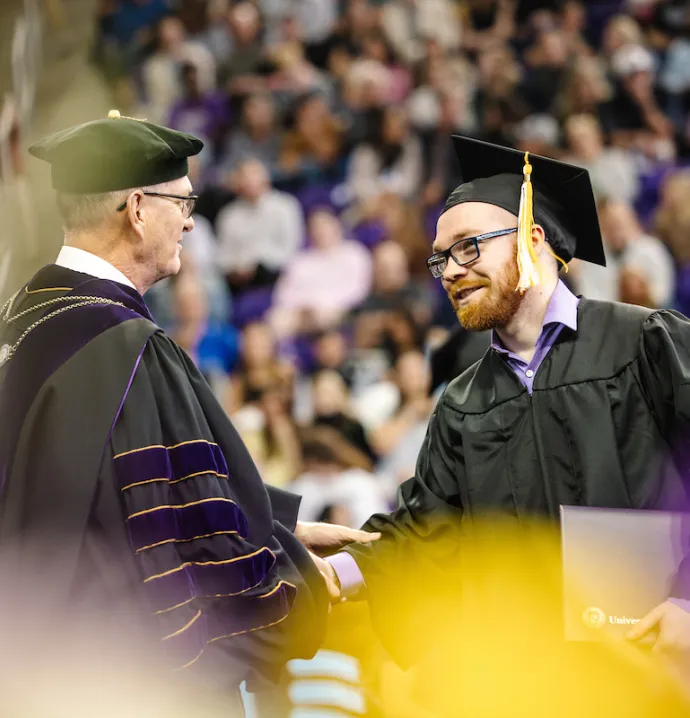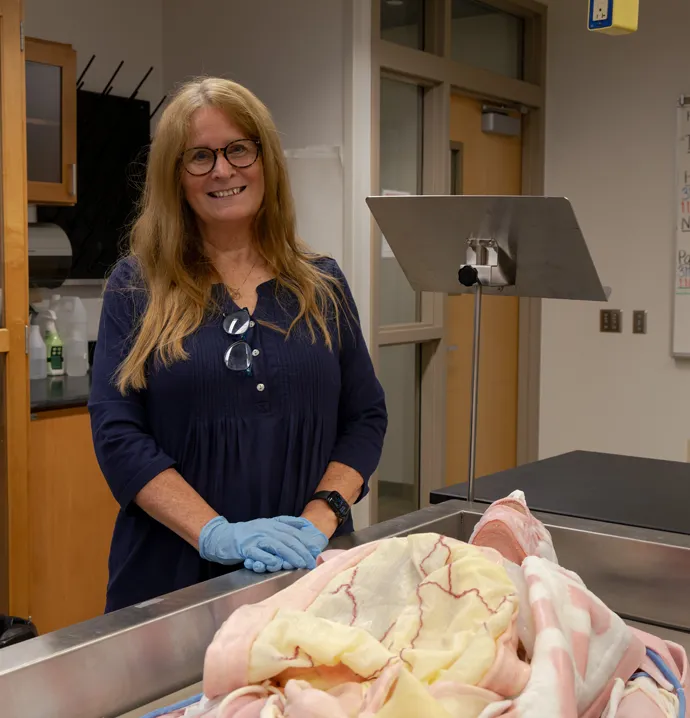UNI textiles lab sets students up for success
UNI textiles lab sets students up for success
Sometimes a little destruction is necessary for creation.
That’s certainly true at the University of Northern Iowa’s Textile and Apparel Product Development and Materials Analysis Laboratory - a unique, $3 million state-of-the-art facility brimming with advanced machinery capable of putting every type of stress imaginable on fabric. National retailers use these sorts of tests to create strong, light fabrics.
The lab - which teaches the science behind modern fashion - is designed to give an early boost to students in UNI’s textiles and apparel program, some of whom have gone on to leadership roles at clothing-industry giants like Cabelas and Macy’s. One UNI graduate even designed the race suits worn by the U.S. women’s ski team at the 2018 Winter Olympics.
“The breadth of topics that UNI exposes you to really is a differentiator between other colleges and universities,” said Melissa East, a 2004 graduate of the TAPP program who worked for Cabelas for 10 years and now works as senior manager of fabric development at Jockey. “It offers that broad education that gives people a head start. My boss at Cabela said his favorite place to hire from was UNI because of the broad education they got.”
Another UNI alumna, Tiff Devine, has used the skills developed in the lab throughout her 15-year design career. She now works with leading brands such as the NCAA, NFL, Playstation and Budweiser on printed clothing design.
“The textiles lab was a unique experience that a lot of my professional peers didn't get the opportunity to have in college,” Devine said.
In a room in Latham Hall, industry-standard machines stretch, tear and abrade materials. They bombard them with color-leeching light and even set them on fire. It’s calculated degradation, designed to determine exactly how well fabrics will perform when they’re made into clothing and subjected to the rigors of everyday use.This strategic dismantling creates a hands-on learning experience and broad foundation of knowledge that sets UNI textiles and apparels program (TAPP) graduates apart from their competitors.
“Technological preparation is increasingly necessary for graduates to compete for high-quality, entry-level positions in the textile and apparel industry,” said Annette Lynch, director of the School of Applied Sciences. “The lab helped create research and educational experiences that enables our graduates to enter the workforce with advanced technological skills on-par with professionals currently working in the industry.”
The lab was formed in 2000 with the help of a grant from the National Science Foundation, which was written in partnership with Target. Outfitted with almost 20 machines that are common in professional settings, the facility was built in response to a change that was sweeping the retail industry. Companies were shifting focus on developing their own product lines instead of buying finished products.
As a result of this change, companies were requiring new hires to possess an increasing technical sophistication that, at the time the lab was being built, was not offered by many academic programs in the country, Lynch said.
East saw the value of those skills immediately when she relocated to Sidney, Nebraska after graduation to start working as a product developer for Cabelas. There, she used company style manuals that stipulate both the testing methods used for its fabrics and the required result of those tests, ensuring that their products meet quality standards for durability, shrinkness, color fastness and more.
And while she has seen graduates from other programs struggle to get up to speed with these standards, East utilized her UNI knowledge to start right out of the gate.
“Having that background of being familiar with those standards, when I started the job, I could open their manual and know what it meant enough to be able to give direction and develop the product accordingly,” East said. “A lot of programs don’t give students that exposure.”
East continued to ascend in the company, eventually moving to Hong Kong in 2010 to head up a project to create the first material theme for Cabelas. Her team developed fabric standards to use across the company’s product lines and created testing specifications to back up Cabelas’ product claims, such as being waterproof.
Now at Jockey, East is continuing with similar projects, and she is imparting the lessons she learned along the way.
“I’ve always told UNI interns I’ve had throughout the years that you need to understand material quality, how it’s made and why things are more expensive,” East said. “UNI does a great job of giving everyone a basic understanding of that part of the business. It doesn’t mean everyone coming out of the program is a material manager, but to have that foundational knowledge is what sets UNI apart.”
And that foundational knowledge is beneficial to graduates who embark on other career paths in the fashion industry. UNI alumna Tiff Devine utilized her knowledge from the materials analysis lab throughout her 15-year career as a designer.
After graduating in 2005 with a degree in textile and apparel design, Devine started her career at Marshall Fields before moving on to Macy’s, where she spent 10 years in multiple roles that allowed her to lead design efforts and travel across the world exploring fashion trends.
In 2016, she moved to Colorado and started working at Spyder, a premier ski brand, as senior graphic designer. There, she designed the race suits for the US men’s and women’s ski team, which were worn in the 2018 Winter Olympics.
In 2018, she moved to a start-up company, Shinesty, where she has worked with leading brands such as NCAA, NFL, Playstation and Budweiser on printed clothing design. And through all of her experiences, she has used the knowledge she gained from the TAPP program and the textiles lab.
“It's an interesting angle to the design world, as a lot of people only look at design as only creative,” Devine said. “The textiles lab was a good way to expose different avenues you could pursue in fashion.”
Beyond the classroom, students can also use the lab to assist faculty in materials research.
UNI alumna Jordan Caruso, who graduated from the program in 2018, assisted the work of now-retired professor Mitchell Strauss. Caruso helped use a fabric drape prediction system in the lab, which allowed Strauss to determine the impact of environmental conditions on the performance of the testing system. The purpose of the device is its cost saving potential for companies wanting to save time and materials when developing early versions of new products. What Strauss and Caruso determined was that the accuracy of the test depended on being able to function in a controlled environment.
The materials lab is the only university in the country with a fabric drape prediction system set up, Lynch said, meaning the experience was something Caruso could only get at UNI.
“Being in a small program allowed me to have that experience in the research I wouldn’t have had anywhere else,” Caruso said.
Immediately following graduation, Caruso started working at Jockey as a materials coordinator.




